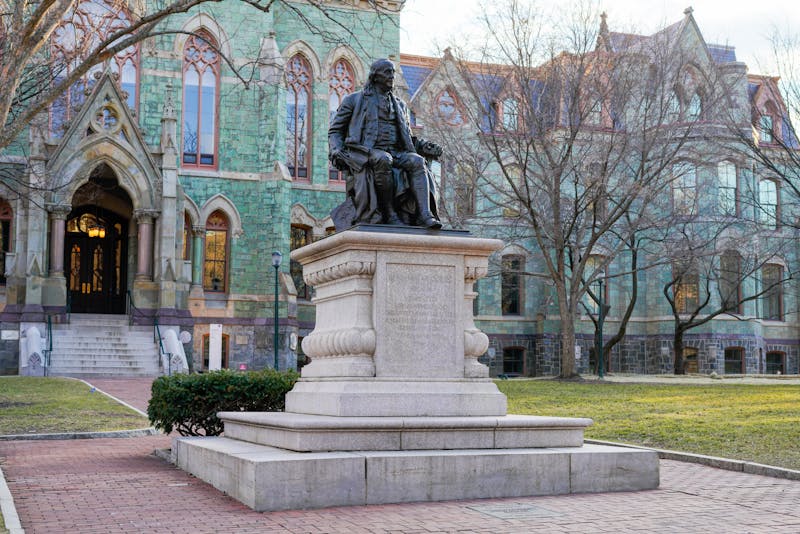
In a virtual event Tuesday evening titled “Black Families Matter: How the U.S. Family Regulation System Punishes Poor People of Color,” Penn Law and sociology professor Dorothy Roberts discussed the systemic racial inequities in the child welfare system.
Penn professor Dorothy Roberts discussed the systemic racial inequities in the child welfare system at a virtual event Tuesday evening.
The event, titled “Black Families Matter: How the U.S. Family Regulation System Punishes Poor People of Color,” is the fourth installment of the 2021-2022 Race and Regulation Lecture Series sponsored by the Penn Program on Regulation and the Penn Law Office of Equity and Inclusion. The series explores the relationship between government regulation and racial inequality, as well as potential policy reforms to combat institutional racism.
In conversation with Penn Program on Regulation Director Cary Coglianese, Roberts discussed her upcoming book, “Torn Apart: How the Child Welfare System Destroys Black Families and How Abolition Can Build a Safer World,” which is set to be published in spring 2022. The book explores how the child welfare system — which Roberts calls the “family policing system” — disproportionately targets Black families and calls for it to be dismantled.
The child welfare system is intended to identify and protect children who are at risk of parental abuse or neglect. Roberts argues, however, that the child welfare system means something different for Black children and white children as Black children live in greater fear of being separated from their parents.
“I'm now convinced that we need to completely dismantle the child welfare system while we build a radically reimagined way of caring for families and keeping children safe,” said Roberts, who is the 14th Penn Integrates Knowledge Professor with joint appointments in the departments of Africana Studies and Sociology and the Law School.
In her lecture, Roberts discussed how the child welfare system has disproportionately targeted “economically and racially marginalized communities” by monitoring families of color and forcing children into foster care, highlighting the connection between the child welfare system and criminal law enforcement.
Roberts said the child welfare system disproportionately criminalizes Black, brown, and Indigenous parents as a “risk” to their children. She added that the child welfare system also criminalizes Black children, citing two examples of Black children who were killed by staff members while they lived in residential care facilities.
Roberts added that low-income Black families are at greater risk of family regulation because they face greater “state surveillance.” She said that, compared to wealthy white families, low-income Black families are more likely to interact with public service providers for their health care, schooling, social services, and welfare benefits, resulting in their increased likelihood of being reported by “mandated reporters.” Roberts defined mandated reporters as professionals — such as teachers, health care providers, and daycare workers — who are required by law to report “suspected child abuse and neglect” to the government.
“[The Child Welfare System] is a multi-billion dollar state apparatus that relies on terrorizing families by taking their children away or weaponizing their children with the threat of removing them in order to impose intensive surveillance on every aspect of the family's life. It executes this extraordinary level of state intervention and family regulation by both acting like police and working hand in hand with criminal law enforcement,” Roberts said.
Roberts added that more than half of Black children will face investigation by Child Protective Services before they reach the age of 18.
Family separation ultimately interferes with Black children’s physical health, social-emotional well-being, and education, Roberts said. Many Black children in foster care face a greater risk of poverty, homelessness, imprisonment, and suicide, Roberts added.
The event concluded with Roberts’ advice on how members of the Penn and larger community can work to combat the structural racism rooted in the child welfare system.
Roberts encouraged the audience to learn more about organizations, such as JMacForFamilies, that are working to abolish the current child welfare system and replace it with a more equitable system. In addition, Roberts encouraged Penn Law students to become involved in family defender services, such as the Interdisciplinary Child Advocacy Clinic at Penn Law.
“Those are just some ways of not only dismantling the system through legislation — through protest — but also just as importantly, building the society that we would want for our families and making sure that we all equally can raise our families,” Roberts said.
The Daily Pennsylvanian is an independent, student-run newspaper. Please consider making a donation to support the coverage that shapes the University. Your generosity ensures a future of strong journalism at Penn.
Donate






